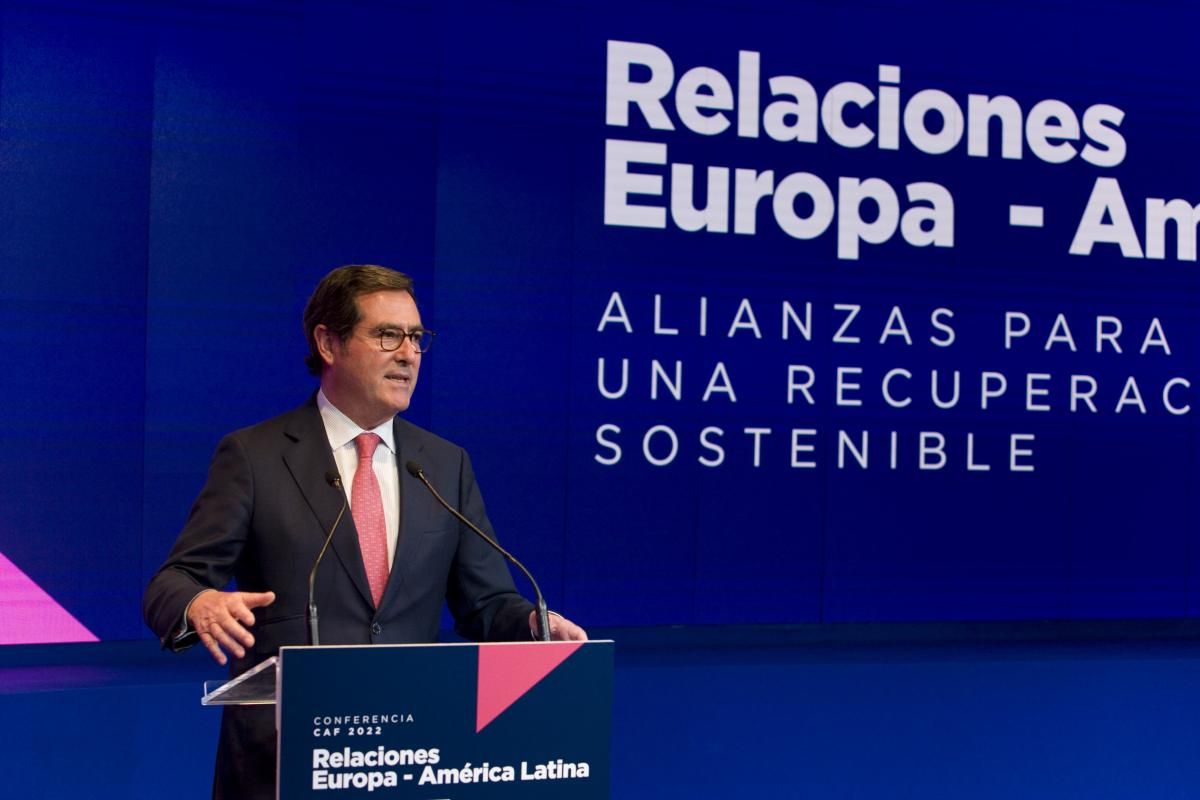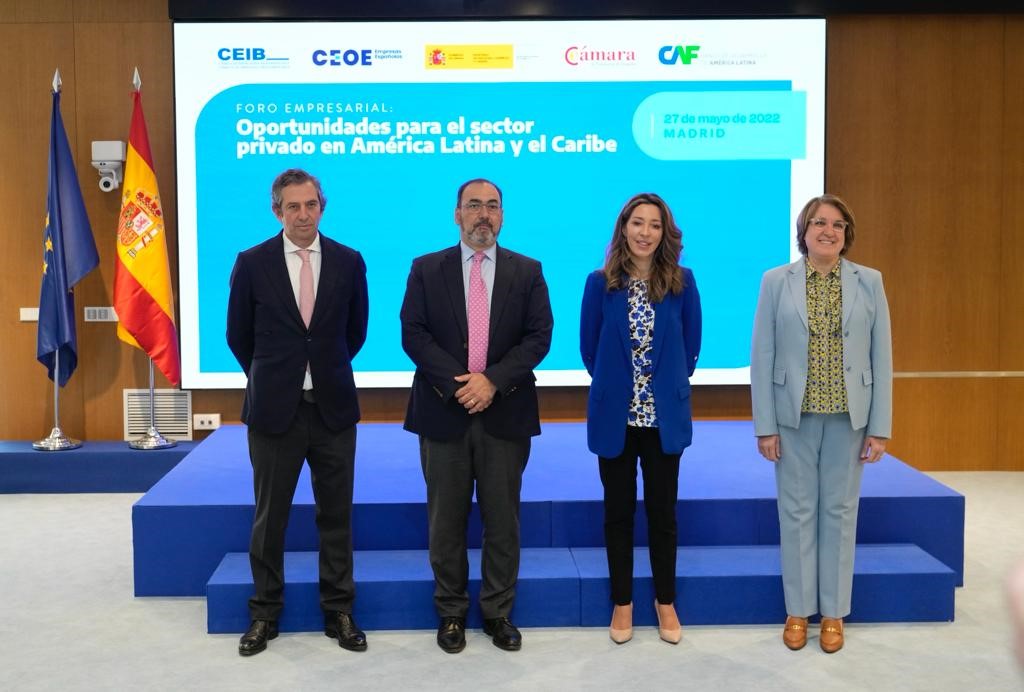CAF and CEOE-CEIB: strategic allies in tackling the economic recovery
Antonio Garamendi and the Permanent Secretary of CEIB, Narciso Casado, also held a meeting with the Executive President of CAF, Sergio Díaz-Granados, to assess how to collaborate jointly for the future.

Over these days, representatives of the CEOE and CEIB have followed an intense schedule of meetings and forums, on the occasion of the visit to Madrid of the president of CAF - development bank of Latin America -, Sergio Díaz-Granados. The programme began yesterday with the President of the CEOE, Antonio Garamendi, who closed the “Europe-Latin America Relations” Conference at Casa de América. He also held a meeting with his counterpart from CAF and with the Permanent Secretary of CEIB, Narciso Casado, to assess possible ways to collaborate jointly in this period of economic recovery. Finally, CEOE vice-president Íñigo Fernández de Mesa took part today in a business forum at the Organisation’s head office, where CAF representatives presented the bank’s main area of action for the coming years.
Conference on “Europe-Latin America Relations” at Casa América
Alliances for a sustainable recovery” was the title chosen by CAF for the Conference on “Europe-Latin America Relations” held yesterday at Casa de América with the support of the Spanish Ministry of Economic Affairs and Digital Transformation, and the Spanish Confederation of Business Organisations (CEOE).
The President of the CEOE, Antonio Garamendi, closed the event by referring to the main economic challenges facing Latin America: to increase productivity, which requires not only investment in infrastructure, but also in other sectors that can transform the structure of the productive fabric. In this respect, “the digital and green transitions are key vectors around which investments must pivot,” he stressed. Green growth can be a great opportunity for the region, since it has enormous potential in renewable energy and vast natural capital.
Garamendi said that investment is required to undertake all these investment projects. Hence the importance of the Development Bank for Latin America, a leading institution in the region, given that it is one of its main sources of multilateral financing, with resources exceeding $14 billion annually. He also insisted upon the importance of strong leadership, in both the private and public sectors, to drive the changes the region needs. Finally, he invited all present to rely on networking platforms, such as the Ibero-American Business Council-CEIB and the CEOE, to continue to contribute to the region’s economic reactivation and modernisation.
CEOE-CEIB and CAF meeting
Also yesterday, the President of the CEOE, Antonio Garamendi, the Permanent Secretary of the Ibero-American Business Council-CEIB, Narciso Casado, and the Executive President of CAF, Sergio Díaz-Granados, held a meeting to assess possible avenues to collaborate for the future, especially regarding the relationship between Ibero-America and the European Union. They also highlighted the important role organisations such as CEIB and BusinessEurope (the European employers’ organisation) will play in this stage of the economic recovery.
Business Forum with the Executive President of CAF
The Executive President of CAF- development bank of Latin America-, Sergio Díaz-Granados, today chaired a forum with businesspeople at CEOE, which allowed attendees to learn first-hand about CAF’s areas of action in sectors of interest to Spanish companies, such as those concerning infrastructure, urban development, sustainability and climate action, among others; and to hear about the new value proposition in the institution’s support for the private sector. The conference was opened by the Secretary of State for Trade, Xiana Méndez; the Vice-President; and the Director General of the Spanish Chamber of Commerce, Inmaculada Riera.
Opening

The Vice-President of the CEOE, Íñigo Fernández de Mesa, stressed that Latin America is hugely important region for Spanish companies, which have a strong presence in key sectors such as banking, energy, communication, construction and infrastructure management, technology services, tourism and the provision of public services. Thus, he stressed that “the Development Bank of Latin America plays an essential role as a guarantor of investment financing, which is necessary to increase growth potential, make it more competitive and attractive on the international stage and to improve citizens’ standard of living.”
Without the presence of Spanish companies in Latin America, our economy would be very different today: weaker, more volatile and dependent solely upon the Spanish and European economic cycle, said the Vice-President of the CEOE. In this context, public-private partnerships also play a decisive role, which is why I would like to mention the importance of the work we have been doing at the tripartite. This alliance between the Secretary of State for Trade, the Spanish Chamber of Commerce and the CEOE, in organising regional, bilateral and sectoral meetings, is bear such fruit, driving the process of internationalising our companies and improving the competitiveness and productivity of our economy.
At the business forum, the Secretary of State for Trade, Xiana Méndez, promoted the presence of Spanish companies in Latin America and the Caribbean, highlighted the fact that “the Ibero-American region has been, is, and will be a priority for Spain. Economic relations have been deepening in recent years, consolidating our trade and investment relationship. In fact, he stressed that over the last year there has been an upward trend in trade exchanges between Spain and Latin America and that the levels prior to the COVID-19 health crisis have been recovered, such that “our foreign sector is a key element in the economic recovery of both Spain and Latin America.” He also emphasised Spanish companies’ firm commitment to this region, despite the difficult international context in recent years, which have been marked by the pandemic; and the positive development of investments, where “growth has been spectacular, with Spain becoming the second largest investor in Latin America, behind only the United States.”
In this area, Xiana Méndez highlighted CAF’s role in fostering business development between this region and Spain; Memoranda of Understanding have been signed with COFIDES and FIEM. Its purpose is to promote collaboration in projects of interest to Spain in Latin America that will foster a more sustainable and inclusive economy through co-financing in sectors including infrastructure, social development, education, health, sustainable development, renewable energies and water supply.
Inmaculada Riera, the Director General of the Spanish Chamber of Commerce, highlighted CAF’s role since its foundation in 1970, as the financial arm of Andean integration, as well as its actions to tackle the challenges posed by the pandemic. Riera referred to Spanish Chamber of Commerce’s responsibility in helping Ibero-American companies and institutions to deal with opportunities and challenges, to the “conviction that the agenda for action and strategic alliances in the coming years will be based on public-private partnership” to mobilise knowledge, technology, innovation and investment, “and in which multilateral financial institutions such as CAF will play an essential role.”
The importance of CAF in the development of Latin America
The panel about “The importance of CAF in the development of Latin America” saw the participation of the President of CAF, Sergio Díaz-Granados; the Corporate Vice-President of Strategic Programming, Christian Asinelli; the Vice-President for the Private Sector, Jorge Arbache, and CAF’s new Manager of Climate Action and Positive Biodiversity, Alicia Montalvo, who presented the institution, its areas of action, and assessed its future strategy, placing special emphasis on investment opportunities in Latin American countries.
The President of CAF, Sergio Díaz-Granados, highlighted the foundation and history of the Development Bank of Latin America, which today is the leading financial institution in the region. In a first phase, he stressed, they realised that they had to change the business plan and begin to invest in key sectors, such as infrastructure. Thanks to this initiative, he explained, the bank grew from being an Andean bank to an international entity.
In a second phase, Diaz-Granados continued, Spain joined CAF’s board of directors, which contributed to improving the quality of the bank’s credit. When it joined the institution, CAF had $3 billion in funding, and last year this figure was $13.2 billion, providing significant support to the region during the pandemic.
Currently, according to Granados, the Bank’s assets have risen by 7 billion dollars, which will allow for an investment of 25 billion in green growth to 2026, a new line of financing for the entity they wish to prioritise most. “CAF is not only a bank that finances works, but is also the greatest asset Latin America and the Caribbean have,” said its President, who also stressed CAF’s strong commitment to Spain as a strategic partner to make projects of interest in the region a reality.
Climate action and green growth
The Corporate Vice-President of Strategic Programming, Christian Asinelli, and CAF’s Climate Action and Positive Biodiversity Manager, Alicia Montalvo, highlighted CAF’s renewed agenda of projects, better known as the “green bank” of Latin America and the Caribbean. They touched, as did the Bank’s president, on the mobilisation of 25 billion dollars over the next five years to boost climate action and conservation of biodiversity. In this way, they explained, it will go from 24% in 2021 to 40% green finance in all its operations in 2026, and 50% in 2030.
The aim, according to Montalvo and Asinelli, is to promote the energy transition, reforestation and forest recovery; to integrate sustainability criteria into all operations, to develop new financial instruments and attract capital from international markets; to promote sustainable and climate-resilient infrastructure; and to foster alliances with strategic actors to generate mitigation and adaptation solutions.
Finally, CAF’s Vice-President for the Private Sector, Jorge Arbache, said that, in Latin America, companies are small and not very productive, while what is needed is to help them grow so that they become strong and dynamic. Like his predecessors, he also stressed the importance of the energy transition in the region, thanks to its abundant natural resources, and he called for the development of the regional carbon market and green hydrogen. It is crucial, he added, to firmly support economic recovery, but “growth must be not only sustainable, but also sustained, less volatile and more predictable.” The bank envisages an ambitious agenda, which, according to Arbache, requires the support of strategic allies to make it a reality, and Spain is undoubtedly among them.
Related news
A large delegation made up of Spanish business organisations and companies took part this Monday and Tuesday, 9 and 10 September, in two high-level meetings with representatives of the Chinese business world, as part of the official visit of the President of the Government, Pedro Sánchez, to the People's Republic of China.
Even though China is our main trading partner in Asia, Spanish companies still have a long way to go to take advantage of the great business and investment opportunities offered by the Chinese market.
The Ibero-American Secretary General, Andrés Allamand; the President of the CEOE, Antonio Garamendi, and the President of the Ibero-American Arbitration Centre-CIAR, Javier Íscar, inaugurate a conference at the CEOE on Ibero-American arbitration. They stress the importance of continuing to support arbitration as an effective and safe instrument for resolving disputes in the region.
Business and investment opportunities in Medellin and the Metropolitan Area were assessed for the Spanish companies with interests in the area.






